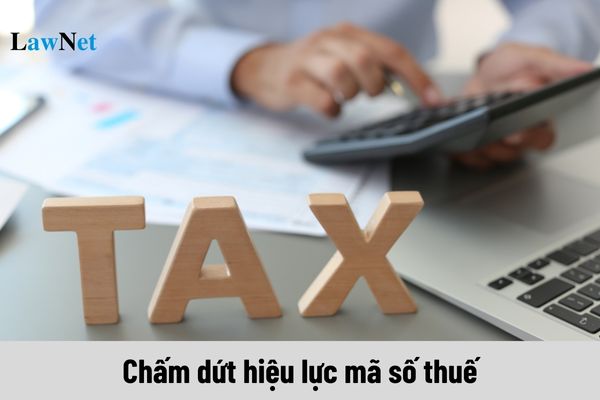What are the cases of TIN deactivation in Vietnam?
What are the cases of TIN deactivation in Vietnam?
According to Clause 1 and Clause 2, Article 39 of the Tax Administration Law 2019, a taxpayer's TIN will be deactivated in the following cases:
- Taxpayers who combine taxpayer registration with business registration shall have their TINs deactivated in one of the following cases:
+ Shutdown or dissolution, bankruptcy;
+ Revocation of certificate of enterprise registration, cooperative registration and/or business registration;
+ Full division, acquisition/merger, consolidation.
- Taxpayers directly registered with tax authorities shall have their TINs deactivated when one of the following cases takes place:
+ Shutdown, termination of tax liabilities for non-business organizations;
+ Revocation of business registration certificate or equivalent license;
+ Full division, acquisition/merger, consolidation;
+ Notified by tax authorities that taxpayers do not operate at registered locations;
+ An individual is dead, missing or incapacitated as prescribed by law;
+ A foreign contractor completes or terminates the contract;
+ Contractors, investors entering into petroleum agreements complete or terminate the agreements or transfer of all rights to enter petroleum agreements.

What are the cases of TIN deactivation in Vietnam? (Image from the Internet)
What does the application for TIN deactivation submitted by household businesses in Vietnam include?
According to Clause 4, Article 39 of the Tax Administration Law 2019 and Point c, Clause 1, Article 14 of Circular 105/2020/TT-BTC, the application for TIN deactivation submitted by household businesses in Vietnam includes:
- The written request for TIN deactivation - Form No. 24/DK-TCT issued along with Circular 105/2020/TT-BTC as stipulated in Articles 38 and 39 of the Tax Administration Law 2019.
- A copy of the decision to revoke the Business Registration Certificate (if any) for the household business; business location of the household business as stipulated in Point i, Clause 2, Article 4 of Circular 105/2020/TT-BTC.
What are the obligations of household businesses in Vietnam before TIN deactivation?
Under Clauses 2 and 3, Article 15 of Circular 105/2020/TT-BTC, household businesses must fulfill the following specific obligations before terminating their tax code in certain cases:
- As for the household/individual business mentioned in point i clause 2 Article 4 of Circular 105/2020/TT-BTC:
(i) The taxpayer shall submit a report on use of invoices as per the law on invoices, if any;
(ii) The taxpayer shall pay the tax liabilities and deal with the overpaid taxes as prescribed in Articles 60, 67, 69, 70, 71 of the Tax Administration Law 2019 to/with the tax authority, for a household/individual business paying the fixed amount of taxes.
(iii) The taxpayer shall file the tax return, remit tax payments and deal with overpaid taxes, excess VAT credits, if any) as prescribed in Article 43, 44, 47, 60, 67, 68, 70, 71 of the Tax Administration Law 2019 with/to the tax authority, for a household/individual business paying the taxes based on declaration method.
- As for a household business upgraded to small and medium-sized enterprise as per the Law on Supporting Small and Medium Enterprises 2017, the household business shall pay the tax liabilities to the supervisory tax authority and undertake in writing with the tax authority that the new small and medium-sized enterprise shall inherit every tax liability from the household business as per the law on assistance for small and medium-sized enterprises.
What are the cases of reactivation of TIN of household businesses in Vietnam?
According to Article 40 of the Tax Administration Law 2019, the regulations are as follows:
TIN reactivation
1. TINs of taxpayers who combine taxpayer registration with business registration shall be reactivated together with as their legal status is reactivated.
2. For taxpayers directly registered with tax authorities, the application for TIN reactivation shall be submitted to their supervisory tax authorities in the following cases:
c) The competent authority revokes the decision on revocation of business registration certificate or equivalent license;
b) The taxpayer wishes to resume their business operations after the TIN deactivation application has been sent to the tax authority, but the tax authority has yet to issue a notification on TIN deactivation;
c) The tax authority has issued an announcement that the taxpayer does not have business operation at the registered address but has not revoked the licence or deactivated the TIN.
...
For household businesses directly registered with tax authorities, the application for TIN reactivation shall be submitted to their supervisory tax authorities in the following cases:
- The competent authority revokes the decision on revocation of business registration certificate or equivalent license;
- The taxpayer wishes to resume their business operations after the TIN deactivation application has been sent to the tax authority, but the tax authority has yet to issue a notification on TIN deactivation;
- The tax authority has issued an announcement that the taxpayer does not have business operation at the registered address but has not revoked the licence or deactivated the TIN.

